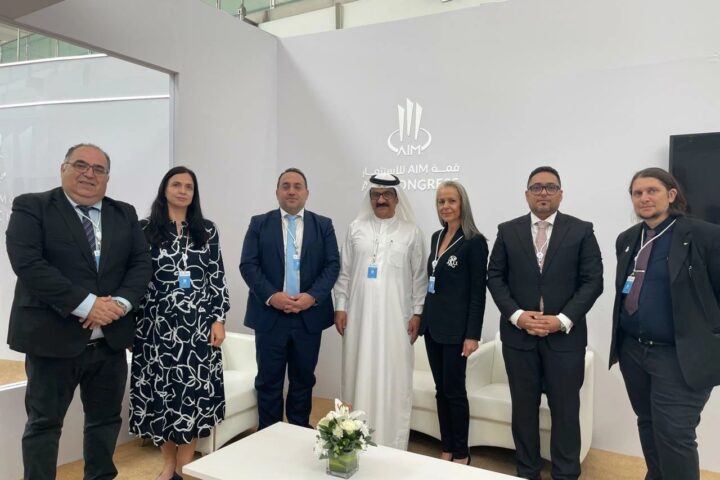* Talks focus on energy cooperation, EastMed security *
The leaders of Cyprus and Israel have reiterated the close ties between the two countries that improved in the 1990s and have recently reached a new level after the discovery of oil and gas deposits in the eastern Mediterranean and the prospect for cooperation. But the rejuvenated relationship has also called into question the regional alliances, particularly the military discipline with which one can describe Israel’s friendship with Turkey.
The most common phrase during Nicos Anastiades’ meetings with Prime Minister Benyamin Netanyahu, Israel’s President Shimon Peres and Knesset Speaker Yuli Edelstein was “we are friends”, as if the host government was making an extra effort to convince the visitors of their true intentions, without upsetting the quirky relationship that Tel Aviv has with the Ottoman Republic.
Just before hopping onto a plane that would take him on a 5-day trip to China, Netanyahu promised that Israel would continue to maintain good ties with Cyprus, regardless of its newly-rekindled relationship with Turkey.
At a press conference after the meeting, Anastasiades said that Israel and Cyprus had “embarked on a strategically important dialogue with a view at enhancing and further developing our bilateral ties, which are founded on common principles and values.”
In an interview with Israel’s Channel Two, the Cypriot president said that he and Netanyahu had agreed, among other things, to cooperate on military projects to protect the gasfields common to both countries. Netanyahu promised, Anastasiades said, that Israel would maintain relations with Cyprus and work with the country to protect the offshore gas fields, regardless of any deals it makes with Turkey, or any threats issued by Ankara.
The political declaration repeated what the Defence Ministers of the two countries had said last week. Fotis Fotiou said that during his meeting in Tel Aviv on Thursday with his Israeli counterpart, they also decided to set up technical committees to promote defence issues and agreed to raise their military cooperation to new levels.
He said that the first meeting of these committees will take place in Cyprus on May 28, adding that “our cooperation with Israel is no threat to anyone. On the contrary, it aims to promote peace, security, stability and development in the region and it is not directed against any state”.
Fotiou did not rule out similar cooperation with other neighbouring countries such as Greece, Lebanon and Egypt, saying that Moshe Yaalon will pay an official visit to Cyprus in the next weeks.
On his part, the Israeli minister was quoted by the media as saying, "we intend to improve the preparedness of our navy in the Mediterranean to protect the gas facilities, and we certainly look forward to cooperation on this issue with Cyprus."
With four offshore gasfields already locating from 37 trln cubic feet of potential natural gas reserves, Cyprus is considering to allow Israel’s air force to use the base at Paphos for patrols in the eastern Mediterranean to prevent terrorist attacks on drilling platforms or future pipelines.
Turkey, on the other hand, has continued its provocation and threatened to explore for oil and gas on its own within the Cyprus Exclusive Economic Zone, despite exploration licenses being awarded to the U.S. Noble Energy, French Total, Italy’s ENI and Seoul-based Kogas.
RELIABLE NEIGHBOUR
Cyprus is Israel’s most reliable neighbour, Anastasiades said on Tuesday, adding that the discovery of oil and gas in the eastern Mediterranean creates new prospects for the relations between the two countries.
“We will move on with our relations to see how we can support each other, how we Europeans can contribute in anything that concerns you. We need you. I am not saying that you need us. And you don’t simply have a neighbour close to you but a brother and we will go on this way. We must work together in order to bring peace, stability and welfare.”
Shimon Peres said that the two countries are linked to each other in many ways, adding that “without Cyprus, Israel lies far from Europe”.
In statements to journalists, President Anastasiades said that “with the decision to build a liquefaction terminal across from the Suez Canal, Cyprus will be offering to those who want to take advantage of it, the infrastructure for exporting to the Far East but also to Europe”.
He added that there was interest from Israeli companies that are involved in the exploitation of natural gas to be also participants in the investment for the construction of the terminal at Vassiliko. Both Delek and Avner are a 30% stakeholder in Block 12, the gasfield explored by U.S.-based Noble Energy that will be deploying an appraisal drill next month to confirm the 7tcf of natural gas deposits.







